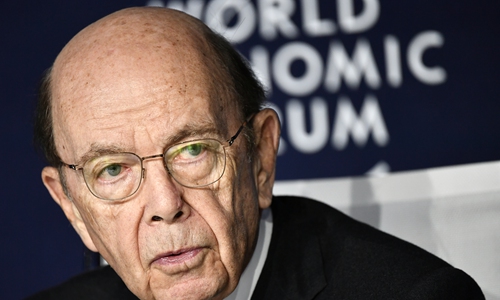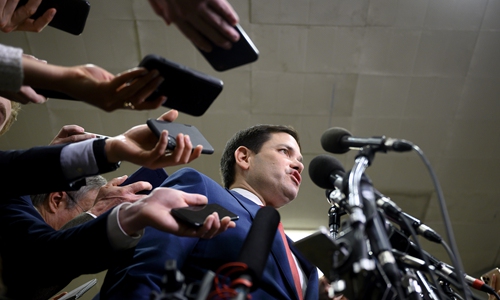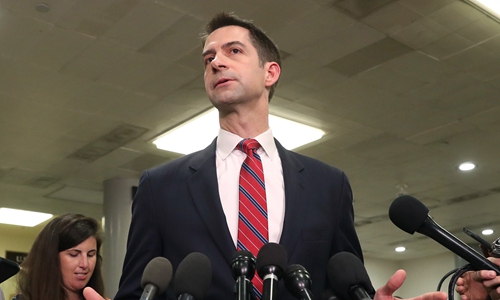HOME >> CHINA
Western politicians and media use Yellow Peril stereotype to smear China amid epidemic
By GT staff reporter Source:Global Times Published: 2020/2/25 21:06:39
○ US political, business and media circles work together, but function separately, to promote white supremacist racism and the advantage of their political system by fabricating "China threat" theory
○ Some Western media outlets ignite "Yellow Peril," instigating Sinophobia by hyping up negative public opinions to satisfy racism and Western superiority
○ Experts said the epidemic serves as an exploitable tool for US Democrats and Republicans to boost exposure during their election campaigns

A slew of "China threat" theory has been revamped in the Western world as some political, business and media sectors use the COVID-19 epidemic to smear China's image with the a cascade of baseless, fearmongering allegations.
These people and institutions are part of certain US political strategies and ideologically-driven attempts to contain China, said Chinese political analysts, emphasizing these "ill attempts" manufactured by many well-known anti-China figures, such as President Donald Trump's adviser Peter Navarro and US Senator Tom Cotton, are clearly biased and doomed to fail.
It has turned out other countries do not necessarily deliver better governance than China when it comes to combating epidemics. The US, a country with a more developed medical system, faces far higher influenza mortality rate, said Shen Yi, a professor on international relations at Fudan University.
The conspiracy theories around the epidemic are both arrogant and ignorant, analysts said, noting that attempts to force China into a downfall will backfire as main economic entities would suffer from the stagnant global industry chain in which China plays a significant role. China ranks as the world's largest goods trader, contributing to nearly 30 percent to the global economy.
Given that cooperation against the virus between China and the US is already under way, these conspiracy theories could undermine the goal of a community and shared future for mankind in the fight against the virus, Shen warned.

Hype in US politics
Given the fact that bashing China has become a bipartisan consensus in US politics, some politicians still go to extra lengths to fuel various suspicions around the cause of the coronavirus.
Navarro, Cotton and Senator Marco Rubio, are known for their anti-China stances typical of neoconservatives.
White House trade adviser Peter Navarro once described China as a "disease incubator," a claim regarded by many as racist and beyond the moral baseline of human civilization.
Republican Senator Tom Cotton has repeatedly slammed the Communist Party of China over the coronavirus outbreak and claimed the virus is "a man-made bioweapon that leaked from the Wuhan Institute of Virology."
Chinese Ambassador to the US Cui Tiankai dismissed to the biological weapons theory as "absolutely crazy," and warned such allegations could stir up suspicion, rumors, racial discrimination, xenophobia, and could "harm our joint efforts to combat the virus."
Cotton's allegation has been largely debunked by biological experts quoted in the media including the Washington Post and the Guardian.
A Huffington Post story titled "Don't listen to Sen. Tom Cotton about Coronavirus," writes that "spreading misinformation and panic in a weeks-long meltdown over the disease" by quoting multiple experts saying his assertion is "ridiculous."
"Tom Cotton is far more dangerous than the Coronavirus," a Twitter user commented on Cotton's anti-China tweet.
"The virus in China is a chance that wasn't easy to wait for some US anti-China forces, especially for Rubio, who acts like a little rascal peddling that China is strife-torn by various difficulties," said Shen.
US hawks including Cotton and Navarro have viewed the epidemic as a "golden opportunity" to stir up trouble, said the analysts. Their evil intentions are so obvious that everyone with rationality can clearly see that.
China-related topics have long been used by US politicians to boost their exposure and gain political capital, so as to obtain more influence, said Li Haidong, professor at the China Foreign Affairs University. He noted that smearing China is especially done when campaigning for US elections in November.
Cotton has also repeatedly accused the World Health Organization (WHO) on his twitter of favoring the Chinese mainland, echoing US Republican Senator Marco Rubio's appeal to the WHO for incorporating Taiwan.
Rubio joined a letter sent to the WHO Director-General Tedros Adhanom Ghebreyesus concerning Taiwan's exclusion from the organization and urging the WHO to grant Taiwan observer status.
"Rubio has an emotional affinity with, in additional to financial support of, Taiwan, because they both have a tendency to betray their homeland," said Shen. Rubio similarly often pushes policies against Cuba.

Gloated merchants
US Secretary of Commerce Wilbur Ross also joined the China bashing camp by disgracefully citing the coronavirus as an American opportunity. He made remarks on January 30 that the virus would help accelerate the return of jobs to the US.
Ross's comments show the selfishness, ignorance, and coldness dominating his thinking and abandonment of diplomatic etiquette, Song Guoyu, a deputy director of the Center for American Studies, Fudan University, wrote in an editorial for the Global Times. Ross is using the public health epidemic that a country of 1.4 billion people is grappling with as an opportunity to realize American corporate interests.
The doom-mongering about China's economy has exaggerated the impact of a temporary public health emergency on global supply chains, said Shen.
Moreover, Ross's remarks exposed US politicians' habit of politically interpreting public health problems, which harms the international community's joint efforts in tackling the epidemic, said Li Haidong.
More racist rand inhumane remarks have surfaced online amid the epidemic in recent days.
"We should take our supplies and go back home. Let the Chinese virus rampage through the ranks of the GT (Global Times) and the rest of the communist party," Kyle Bass, the founder and chief investment officer of Dallas-based Hayman Capital Management once wrote in his comment responding to Global Times chief editor's tweet.
Bass later deleted the tweet but refused to give any apology for his hateful "wish." He has more than 129,000 followers on Twitter, making him one of the influential voicers on Twitter. Such kind of strong anti-Communist hate speech will undoubtedly lead to serious protests.
This longtime China critic stirred mountains of anger about his hatred to all Communist Party of China (CPC) members which is unacceptable in modern civilization.
"The US deems China as an ideological rival and some US politicians wouldn't like to see any success of socialism led by the Communist Party in any part of the world, despite the fact that China has proved such a success," said Li to the Global Times.
Taking this trend fuels the US smear campaign against China, he added.
Media accomplice
Some Western media outlets have despicably fueled racial discrimination and anti-China sentiment, represented by a notorious report of the Wall Street Journal with the malicious headline "China is the Real Sick Man of Asia" that received backlash from both readers and WSJ reporters.
The Chinese Foreign Ministry announced on February 19 that China has decided to revoke the press cards of three journalists of the WSJ in Beijing from Wednesday over an article with a "racist headline," which slandered China's efforts in fighting the coronavirus outbreak.
The Bloomberg Businessweek featured the "Fragile China" as their frontpage story on February 17, following the steps of other biased Western media, including German news magazine Der Spiegel which titled its cover story "Coronavirus Made in China," and Danish daily Jyllands-Posten that published a satirical cartoon replacing the stars on the Chinese flag with the coronavirus.
Jorg Wuttke, the president of the European Chamber of Commerce in China, conflated China in midst of the epidemic with "Europe in Medieval Times," as quoted by The New York Times.
The comparison of China's current situation to "medieval Europe" is clearly an attempt by some groups to strike China by evoking the memory of the "Dark Ages," and this reflects their personal will to see a regressive China, said Li. But this will never be achieved.
The disease control systems of the US and China have been in constant communication and cooperation since the outbreak of coronavirus in multiple ways, which reflect that both countries are responsible in global stride against the virus as germs know no borders, Shen suggested.
What is needed now, more than conspiracy theories against China, is a new direction of globalization that promotes global medical resources altogether to combat the deadly virus, he said.
Newspaper headline: Sinophobia sickness
○ Some Western media outlets ignite "Yellow Peril," instigating Sinophobia by hyping up negative public opinions to satisfy racism and Western superiority
○ Experts said the epidemic serves as an exploitable tool for US Democrats and Republicans to boost exposure during their election campaigns

US Secretary of Commerce Wilbur Ross attends the World Economic Forum in Davos, Switzerland, on January 22. Photo: AFP
A slew of "China threat" theory has been revamped in the Western world as some political, business and media sectors use the COVID-19 epidemic to smear China's image with the a cascade of baseless, fearmongering allegations.
These people and institutions are part of certain US political strategies and ideologically-driven attempts to contain China, said Chinese political analysts, emphasizing these "ill attempts" manufactured by many well-known anti-China figures, such as President Donald Trump's adviser Peter Navarro and US Senator Tom Cotton, are clearly biased and doomed to fail.
It has turned out other countries do not necessarily deliver better governance than China when it comes to combating epidemics. The US, a country with a more developed medical system, faces far higher influenza mortality rate, said Shen Yi, a professor on international relations at Fudan University.
The conspiracy theories around the epidemic are both arrogant and ignorant, analysts said, noting that attempts to force China into a downfall will backfire as main economic entities would suffer from the stagnant global industry chain in which China plays a significant role. China ranks as the world's largest goods trader, contributing to nearly 30 percent to the global economy.
Given that cooperation against the virus between China and the US is already under way, these conspiracy theories could undermine the goal of a community and shared future for mankind in the fight against the virus, Shen warned.

US Senator Marco Rubio speaks to journalists on Capitol Hill in Washington, DC, on January 8.Photo: AFP
Hype in US politics
Given the fact that bashing China has become a bipartisan consensus in US politics, some politicians still go to extra lengths to fuel various suspicions around the cause of the coronavirus.
Navarro, Cotton and Senator Marco Rubio, are known for their anti-China stances typical of neoconservatives.
White House trade adviser Peter Navarro once described China as a "disease incubator," a claim regarded by many as racist and beyond the moral baseline of human civilization.
Republican Senator Tom Cotton has repeatedly slammed the Communist Party of China over the coronavirus outbreak and claimed the virus is "a man-made bioweapon that leaked from the Wuhan Institute of Virology."
Chinese Ambassador to the US Cui Tiankai dismissed to the biological weapons theory as "absolutely crazy," and warned such allegations could stir up suspicion, rumors, racial discrimination, xenophobia, and could "harm our joint efforts to combat the virus."
Cotton's allegation has been largely debunked by biological experts quoted in the media including the Washington Post and the Guardian.
A Huffington Post story titled "Don't listen to Sen. Tom Cotton about Coronavirus," writes that "spreading misinformation and panic in a weeks-long meltdown over the disease" by quoting multiple experts saying his assertion is "ridiculous."
"Tom Cotton is far more dangerous than the Coronavirus," a Twitter user commented on Cotton's anti-China tweet.
"The virus in China is a chance that wasn't easy to wait for some US anti-China forces, especially for Rubio, who acts like a little rascal peddling that China is strife-torn by various difficulties," said Shen.
US hawks including Cotton and Navarro have viewed the epidemic as a "golden opportunity" to stir up trouble, said the analysts. Their evil intentions are so obvious that everyone with rationality can clearly see that.
China-related topics have long been used by US politicians to boost their exposure and gain political capital, so as to obtain more influence, said Li Haidong, professor at the China Foreign Affairs University. He noted that smearing China is especially done when campaigning for US elections in November.
Cotton has also repeatedly accused the World Health Organization (WHO) on his twitter of favoring the Chinese mainland, echoing US Republican Senator Marco Rubio's appeal to the WHO for incorporating Taiwan.
Rubio joined a letter sent to the WHO Director-General Tedros Adhanom Ghebreyesus concerning Taiwan's exclusion from the organization and urging the WHO to grant Taiwan observer status.
"Rubio has an emotional affinity with, in additional to financial support of, Taiwan, because they both have a tendency to betray their homeland," said Shen. Rubio similarly often pushes policies against Cuba.

US Senator Tom Cotton speaks to the media after attending a briefing with administration officials about the situation with Iran on January 8 in Washington, DC. Photo: AFP
Gloated merchants
US Secretary of Commerce Wilbur Ross also joined the China bashing camp by disgracefully citing the coronavirus as an American opportunity. He made remarks on January 30 that the virus would help accelerate the return of jobs to the US.
Ross's comments show the selfishness, ignorance, and coldness dominating his thinking and abandonment of diplomatic etiquette, Song Guoyu, a deputy director of the Center for American Studies, Fudan University, wrote in an editorial for the Global Times. Ross is using the public health epidemic that a country of 1.4 billion people is grappling with as an opportunity to realize American corporate interests.
The doom-mongering about China's economy has exaggerated the impact of a temporary public health emergency on global supply chains, said Shen.
Moreover, Ross's remarks exposed US politicians' habit of politically interpreting public health problems, which harms the international community's joint efforts in tackling the epidemic, said Li Haidong.
More racist rand inhumane remarks have surfaced online amid the epidemic in recent days.
"We should take our supplies and go back home. Let the Chinese virus rampage through the ranks of the GT (Global Times) and the rest of the communist party," Kyle Bass, the founder and chief investment officer of Dallas-based Hayman Capital Management once wrote in his comment responding to Global Times chief editor's tweet.
Bass later deleted the tweet but refused to give any apology for his hateful "wish." He has more than 129,000 followers on Twitter, making him one of the influential voicers on Twitter. Such kind of strong anti-Communist hate speech will undoubtedly lead to serious protests.
This longtime China critic stirred mountains of anger about his hatred to all Communist Party of China (CPC) members which is unacceptable in modern civilization.
"The US deems China as an ideological rival and some US politicians wouldn't like to see any success of socialism led by the Communist Party in any part of the world, despite the fact that China has proved such a success," said Li to the Global Times.
Taking this trend fuels the US smear campaign against China, he added.
Media accomplice
Some Western media outlets have despicably fueled racial discrimination and anti-China sentiment, represented by a notorious report of the Wall Street Journal with the malicious headline "China is the Real Sick Man of Asia" that received backlash from both readers and WSJ reporters.
The Chinese Foreign Ministry announced on February 19 that China has decided to revoke the press cards of three journalists of the WSJ in Beijing from Wednesday over an article with a "racist headline," which slandered China's efforts in fighting the coronavirus outbreak.
The Bloomberg Businessweek featured the "Fragile China" as their frontpage story on February 17, following the steps of other biased Western media, including German news magazine Der Spiegel which titled its cover story "Coronavirus Made in China," and Danish daily Jyllands-Posten that published a satirical cartoon replacing the stars on the Chinese flag with the coronavirus.
Jorg Wuttke, the president of the European Chamber of Commerce in China, conflated China in midst of the epidemic with "Europe in Medieval Times," as quoted by The New York Times.
The comparison of China's current situation to "medieval Europe" is clearly an attempt by some groups to strike China by evoking the memory of the "Dark Ages," and this reflects their personal will to see a regressive China, said Li. But this will never be achieved.
The disease control systems of the US and China have been in constant communication and cooperation since the outbreak of coronavirus in multiple ways, which reflect that both countries are responsible in global stride against the virus as germs know no borders, Shen suggested.
What is needed now, more than conspiracy theories against China, is a new direction of globalization that promotes global medical resources altogether to combat the deadly virus, he said.
Newspaper headline: Sinophobia sickness
Posted in: IN-DEPTH